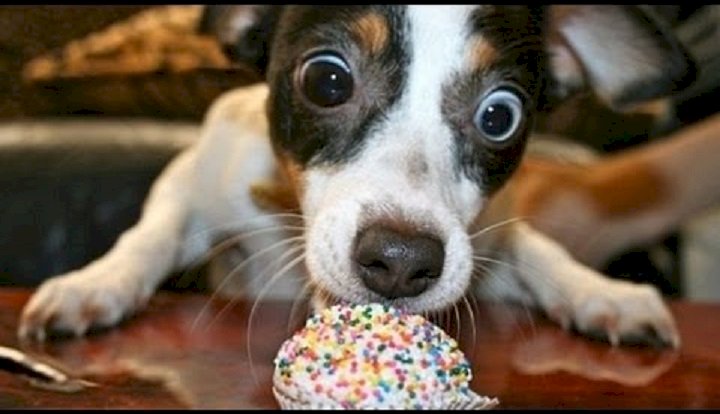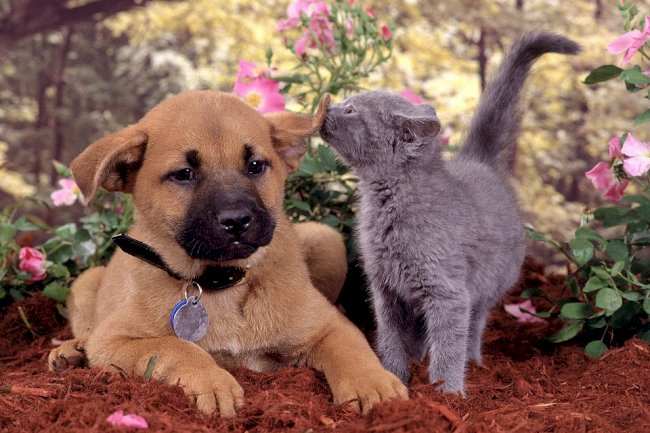Nutrition: Table Scraps Vs Treats
Most of us are guilty of sneaking a tasty table scrap to our pets during or after dinner.

Most of us are guilty of sneaking a tasty table scrap to our pets during or after dinner. While there is not anything inherently wrong with giving your pet an occasional morsel left on your plate, there are some very good reasons to limit your handouts to treats made for dogs. Giving dogs a bit of leftover lean meat, non-buttered vegetables, and a little rice will not cause problems, but unfortunately, many people do not stop there.
Once a moocher, always a moocher.
Once you reward begging behavior with table scraps or something off your plate, you can expect to see the same hopeful eyes looking up at you every meal from that day forward. That is fine if you do not mind, but if you have a dog that whines, the behavior may disrupt your dinner. If you do mind, you will have a hard time training your dog to stay out of the room now that he knows he just might get a handout. Also, some dinner guests do not appreciate a tongue-wagging dog at their elbow while they try to eat their meal.
Table scraps do not offer the nutrition dogs need.
The more you fill your pet up with your food the less likely he is to eat his own. And since our nutritional needs are not the same as our dogs', your dog will get less of the vitamins and minerals he needs and probably more of those he does not need. Quality dog treats are developed with your dog's nutritional needs in mind.
Table scraps are the quickest route to weight problems.
Many times scraps are nothing more than empty calories. And since you probably save that hunk of fat or sweet morsel you know your dog will like, he gets all the wrong food for a trim waistline. Overweight pets, besides not looking their best, have a higher risk of many health problems.
Table scraps are a leading cause of digestive disorders.
The rich foods we eat can wreak havoc on your dog's digestive tract. A simple, consistent diet keeps their system functioning as it should. Throw in your very different foods and spices and do not be surprised if your dog has bad gas, bad breath, loose stools, etc.
You could end up with a finicky eater.
If your dog develops a taste for your food, he may stop eating his own. After all, which would you prefer, dry dog food or juicy steak and hamburger every night?
You may create a thief.
Pets that are used to eating human food are more likely to devour the turkey leftovers you left unattended on the kitchen table. Or bury their heads in the garbage can to get at that fish you 'forgot' to give them. As you know, many bones, chocolate, and other food items can be dangerous to your dog.
Treats are a better choice.
A dog treat gives you and your dog the same satisfaction as giving or receiving a table scrap. It promotes that special bond between you and your dog, it gives your pet a new, delicious taste to savor, and it makes both of you feel good.
Quality dog treats are usually more nutritious and tend to have far fewer calories than most table scraps. Liver products are great treats because they provide nutrients your dog is unlikely to obtain from any other food source.
There are other benefits, too, depending on the type of treat you buy. Biscuit-type treats are good for your dog's teeth as they help scrape off plaque and tartar that can cause dental problems. Rawhide satisfies a dog's urge to chew, relieves boredom, and is also good for teeth.
Treats also do not encourage bad behavior. In fact, it is usually the opposite. Treats can be used during training to reward good behavior, but be careful not to overdo it.
As with anything in life, treats should be used in moderation. Too many treats can add weight and affect your dog's meals. As a rule, treats should never account for more than 10% of your dog's food intake. Your dog's food is his sole source for the nutrition he needs, so do not 'fill' your pet up on treats before meal time. Remember, no chocolate, no bones that splinter easily, and no high-fat, greasy foods.
SOURCES
[1] "Pet MD"
[2] "Nylabone"
[3] " Cesar's Way"
[4] "Pet Education"
[5] "Pet Food Nutrition"
[6] "The Whole Dog Journal"
[7] "Dog Conspiracy"






















